The journalists at BuzzFeed News are proud to bring you trustworthy and relevant reporting about the coronavirus. To help keep this news free, become a member and sign up for our newsletter, Outbreak Today.
As a server at a combination Dunkin’ and Baskin-Robbins in southeast Georgia, Mickey Lewis made $8 an hour, which amounted to around $850 a month after taxes. After $375 in rent, around $100 in utilities, and at least $200 more in gas, groceries, and car insurance, the 22-year-old usually had $40 or $50 of wiggle room, to put in the bank or spend on a treat like dinner out. Down the line, the goal was to enroll in a local technical college.
Lewis started feeling warm on March 26, when there were only two confirmed cases of COVID-19 in the county. The fever was low, around 99.5 degrees, and sporadic. Like around 30 million others around the country, Lewis was used to working without paid sick leave. In nine months with the company, Lewis, who uses the pronoun “they,” hadn’t missed a single shift: “If we weren't there and clocked in, we didn't get the hours,” they said. “Cut and dry.”
The pandemic was supposed to have changed that equation. A week earlier, Congress had passed a law to “ensure that workers are not forced to choose between their paychecks and the public health measures needed to combat the virus,” as the Trump administration put it. Yet when Lewis informed the store manager about the fever, they recalled, the manager said that the branch’s sick leave policy remained the same — except that employees who call in ill now needed to bring in a doctor’s note. To get approval for a 14-day self-isolation, a worker would need a positive COVID-19 test — and even then, it would be unpaid. Lewis continued to clock in for their shifts over the next week, feeling fine some days, fatigued on others.
By then, Dunkin’ Brands, the parent company for 21,000 franchise-operated branches worldwide, had limited store service to takeout, delivery, and drive-thru orders. At Lewis's branch, lines of 10 or more cars stretched across the lot and into the gas station next door. During the morning rush, the staff of seven served coffee and breakfast sandwiches to dozens of people heading to work at jobs their employers deemed essential — chopping lumber, loading cargo at railway stations, operating the machines at a nearby boat factory. The afternoons were busier than in normal times, mostly with parents and children. The workers wore gloves and rationed a half-full jug of hand sanitizer because suppliers were out of stock. Each seven-hour shift, Lewis estimated, they served at least 200 cars in the drive-thru and 40 people at the counter inside.
On April 1, Lewis returned home feeling worse than usual and found that the fever had risen to 103. By that point, there were at least a dozen confirmed cases in the county and two deaths. With mild symptoms and no underlying health conditions, Lewis doubted a test was possible. (Georgia has one of the worst testing rates in the nation.) They decided to quit their job right then and take their chances among the millions of newly unemployed.
“I no longer felt that the low pay was worth putting my family, myself, and the community at any further risk,” Lewis told BuzzFeed News. “I think it was just guilt at a certain point.”
Signed into law March 18, the Families First Coronavirus Response Act promised two weeks of federally funded paid leave for workers who show COVID-19 symptoms but are unable to get diagnosed, as well as two-thirds pay for those taking care of someone under a quarantine.
But the law doesn’t apply to businesses with 500 or more employees, which includes many of the companies still open and providing locked-down Americans with essential supplies. The Trump administration stated that the law didn’t need to cover those companies because they can provide their workers with sick pay on their own. “Obviously, big companies can afford these things,” Treasury Secretary Steve Mnuchin told Fox News.
But a BuzzFeed News investigation has found that many of those companies are not complying. At least 24 major retail and food companies that remain open have sick leave policies less generous than what the federal government established for smaller businesses. Grocers, such as Safeway and Walgreens, require a positive COVID-19 test to qualify for two weeks' paid leave. Fast-food chains, such as Dunkin’ Brands and McDonald’s, let franchise owners determine time-off policies at more than 90% of branches, leaving many employees with a few days of paid sick leave at most, and sometimes none at all. Retailers, such as Dillard’s and Michaels, are widely staffed by part-time workers who don’t qualify for paid time off, except in the 10 states that have passed laws mandating it.
These companies employ hundreds of thousands of people who are still clocking in. As the US settles into a hibernation period with no known end date, on-the-ground workers across the country don’t have enough paid sick leave to cover a two-week quarantine, sometimes even if they are at high risk of complications due to age or medical history.
More than two dozen service workers who spoke to BuzzFeed News said they continued to clock in even though they or someone they lived with were elderly, immunocompromised, or had preexisting respiratory conditions. Thirty-one employees across eight national chains told BuzzFeed News that they or a coworker went to work with a fever or cough in the last month.
“They won't pay you, but you can volunteer to stay home,” said an Oregon McDonald’s employee who developed a cough two weeks after her son and granddaughter began showing COVID-19 symptoms. “I can't just stay home. It isn't that easy.”
An ongoing BuzzFeed News investigation, based on internal communications at 13 companies and interviews with more than 200 service workers in at least 40 states, has exposed how major companies have created this very dilemma for hourly service workers again and again. The paid sick leave loophole for large employers underscores the extent to which decisions that can have crucial public health consequences have been placed in the hands of private companies.
Sixteen of the 24 companies contacted by BuzzFeed didn’t respond to requests for comment. The eight that did — Whole Foods, Walgreens, McDonald’s, Papa John’s, Kroger, The Fresh Market, Dollar Tree, and Dollar General — each said that they are committed to the safety of employees and customers and have done their best to adjust policies amid a fast-changing situation.
Are you still working during the coronavirus outbreak? We'd love to hear your story. Email albert.samaha@buzzfeed.com or reach out via one of our tip line channels.
America’s hourly service workers have little control over the terms of their employment. In the absence of national standards on severance, bargaining, and time off, they are mostly left to rely on the generosity of their employers. Dozens of hourly workers at major retail and food companies told BuzzFeed News that their bosses can unilaterally fire them without compensation, reduce their hours, deny their requests for time off, or move them to a position that earns less commission. The US stands nearly alone in the world in the power its government grants private companies over its workforces. Unlike more than 90% of countries, the US has no minimum requirement for paid sick leave or vacation time. Of the 32 developed nations comprising the Organisation for Economic Cooperation and Development, the US is one of three whose national minimum wage hasn’t risen in value over the last two decades.
Long before the pandemic hit, service work had replaced factory work as the dominant hourly job, but with lower pay and often fewer benefits. Around two-thirds of minimum wage jobs in the US are in the retail and hospitality industries, which together employ around 35 million people, a fifth of the country's workforce and roughly equivalent to the combined number of public sector and manufacturing workers. Around 46% of the country’s minimum wage employees are black or Latinx, according to data compiled by the Bureau of Labor Statistics.
Now, many of those hourly workers — those who haven’t been laid off, at least — face the risk of exposure while performing vital functions on the ground, sometimes interacting with hundreds of people a day. At grocery tills, behind drive-thru counters, and atop delivery bikes, they help the millions of Americans staying home get food and other necessities. Many continue to do it with little safety net to speak of.
A delivery person at a Papa John’s in California — who, like many, spoke on condition of anonymity for fear of losing her job — told BuzzFeed News that she is allowed only 24 hours of paid sick leave during a six-month period. Her husband, who was laid off last month, and their three kids are relying on her, she said, so she needs every hour on the clock that she can get.
“I’m personally terrified of going to work each day,” she said. “We were deemed essential, but in reality we are expendable.”

At a Taco Bell branch in Ohio, the shift manager did what he could to help his staff feel safe. When an employee with asthma expressed discomfort about coming into work, the shift manager allowed him to go on unpaid leave. He staffed drive-thru windows with workers in their fifties or younger, moving older employees to the kitchen, where they could fry ground beef and wrap burritos farther away from customers. He emphasized rigorous cleaning, he said, even as it slowed the drive-thru times that his bosses used to evaluate his branch’s productivity.
He put up no resistance when employees called in sick with possible COVID-19 symptoms, though he knew other managers required a doctor’s note. But employees were still coming to work unwell. Most days since the pandemic started, he said, at least two workers have called in sick, some citing a combination of fatigue, coughing, fever, or chest pressure, but most of them were back the next day — not because they had recovered, but just because they couldn’t afford to miss more hours.
“All the employees have just accepted that at some point they will probably get COVID-19,” said the manager, who gets no paid sick leave himself. “Once we resolved ourselves to that inevitability, we all relaxed some.”
“All the employees have just accepted that at some point they will probably get COVID-19. Once we resolved ourselves to that inevitability, we all relaxed some.”
Some big companies have expanded paid sick leave policies to allow for self-quarantine if necessary. In-N-Out replenished employees’ paid sick time so that everyone had at least two weeks available. Home Depot gave an additional 80 hours of paid time off to full-time employees and 40 to part-timers, and doubled those numbers for people over 65. Trader Joe’s offered two weeks' paid sick leave to anyone showing symptoms, and Starbucks offered 30 days paid to anyone who felt uncomfortable coming in. Best Buy’s new policy states that “anyone feeling sick is told to stay home, and they will be paid for that time,” GameStop offers two weeks' paid leave to those who “feel sick or in any way may have been exposed to a confirmed case,” and Domino’s covers quarantine pay for “those with any possible exposure to the virus.”
But for employees at many other big companies that are still open — including Safeway, Chick-fil-A, CVS, Walgreens, Dillard’s, Dollar General, Dollar Tree, Michaels, Jo-Ann, Rent-A-Center, Costco, Staples, Office Depot, Olive Garden, and MarketSource — two weeks of paid leave are available only with a positive test, even though widespread testing remains unavailable in the US. Without a test, Walmart employees need a government-ordered quarantine, rare in many places, while employees at Kroger and the Fresh Market require a doctor’s order, even though wait times for medical appointments have stretched for days. Whole Foods, which is owned by Amazon, provides paid leave for employees who take care of somebody diagnosed, but employees with symptoms “would be handled on a case by case basis,” an Amazon spokesperson told BuzzFeed News.
McDonald’s and Yum Brands, which runs Taco Bell, Pizza Hut, and KFC, announced similar two-week policies requiring a quarantine order from the government or a doctor. Papa John’s and Restaurant Brands International, which runs Burger King and Popeyes, gave managers authority to grant two weeks' paid leave without a diagnosis. But even those company policies apply only to corporate-owned franchises, which account for less than 15% of their branches. Dunkin’ Brands, which has no corporate-owned locations, has not issued any paid leave policy guidance to its franchises.
Many franchise owners operate a network of branches independent from the parent company, and those networks are often huge, with hundreds of locations, putting them well above the 500-employee threshold mentioned in the new federal sick leave mandate. Flynn Restaurant Group, which has around 300 Taco Bell locations, did not respond to a request for comment. Neither did Dunkin' Donuts Independent Franchise Owners, a coalition that represents the interests of member store operators.
McDonald’s is partnering with franchises “to make changes to restaurant operations to serve food safely and conveniently with the health and well-being of restaurant employees top of mind,” the company told BuzzFeed News in a statement. “Employees at a large percentage of franchised restaurants will receive emergency paid leave through the Families First Coronavirus Response Act.”
When the Service Employees International Union surveyed 843 McDonald’s workers in 39 states in early April, 22% reported “coming to work when they felt sick since the Coronavirus epidemic started,” most of them citing a lack of paid leave, as well as fear of losing their job for missing too many shifts. After an employee in Los Angeles tested positive for COVID-19 on April 5, McDonald’s workers in more than 50 stores across five states went on strike.
Terrence Wise, a shift manager at a McDonald’s branch in Missouri, told BuzzFeed News that when a coworker had close contact with someone who tested positive, the franchise’s upper management “told her not to work for the next 16 days” but “didn’t offer any paid sick leave.”
More than a dozen employees at McDonald’s, Taco Bell, and Dunkin’ franchises told BuzzFeed News that their managers had not implemented sick leave policies on par with the federal mandate for small businesses. The Taco Bell shift manager in Ohio and a McDonald’s shift manager in Michigan each told BuzzFeed News that their higher-ups explained, in conference calls, that they were exempt from the federal policy because their franchise owner employed more than 500 people across multiple branches.
“Unfortunately most of my coworkers are unable or unwilling to challenge them on this,” the Michigan shift manager said, because they believe “that doing so will risk their employment here.”

Every day at work, P. is reminded that she is fortunate to still have a job. A salesperson at an Indiana Rent-A-Center, one of the company’s 22,000 employees, she has seen the pandemic’s economic impact in the surge of missed payments she is responsible for tracking. Under normal circumstances, around 1% of customers were past due at the end any given week; the first week of April, 24% of accounts went unpaid.
On Fridays and Saturdays, she drives a van to the homes of past-due customers to retrieve furniture and appliances they’d hoped to own after paying off. She has encountered angry parents, crying children, and frightened senior citizens while extracting couches, chairs, and tables. “It breaks my heart,” she said.
She hasn’t yet been assigned to take back a refrigerator or computer, but she said that she has spoken with colleagues who have. If put in that situation, “I won’t do it,” she said. “I won’t take necessities.” Rent-A-Center did not respond to a request for comment.
“I am going to have to hope that the places I owe money will be more understanding than the place I work.”
Before the world was upended, P. had saved up a week’s worth of paid time off for a vacation scheduled for March 22 to 28. She had planned to take her 12-year-old daughter to a few state parks, then cap off their week with a long shopping trip. But on March 16, she found herself unusually winded at work, went home early, then developed a fever that night. She needed a positive test to qualify for 10 days of paid sick leave, but the doctor she visited said she wouldn’t get one because her symptoms were mild and she had no underlying conditions. She used her saved-up PTO for her first week out sick, then went unpaid for the next week while she awaited a pending claim for short-term disability, which ended up taking three weeks to process and only covered around 60% of her normal wages.
Her income didn’t leave her any room to absorb a week of missed pay, and she has been playing catchup in the days since. At the start of April, she didn’t have enough for her car payment or her internet and electricity bills.
“This week,” she said, “I am going to have to hope that the places I owe money will be more understanding than the place I work.”

Though 40 states have issued directives calling on “nonessential” businesses to close, the specifics of those policies vary by location, and at national chains, it falls to corporate executives to decide which local rules apply to them and which do not. Employees at more than a dozen companies with open stores told BuzzFeed News that their managers or corporate executives asserted that they would close only if explicitly mandated by local government officials.
Michaels was ordered to close in New York, Maryland, and Connecticut but remains open elsewhere. Pennsylvania deemed Office Depot nonessential, while other states ruled the store sells necessary supplies. After governors in Illinois and Ohio ordered Hobby Lobby to close stores, the company did so, before quietly reopening locations a few days later, as Business Insider first reported.
“We believe keeping our doors open for as long as we can, where possible, is the best thing we can do to provide income for you and your families.”
The Department store Dillard's has continued welcoming customers wherever there isn't a direct government order, including at some malls where neighboring stores have pulled down their grates. “We believe keeping our doors open for as long as we can, where possible, is the best thing we can do to provide income for you and your families,” Bill and Alex Dillard, brothers whose family founded the company in 1938, wrote in an email to employees. Dillard’s did not reply to a request for comment.
As a sales clerk at Dillard’s in South Carolina, which has not included department stores in its list of nonessential businesses ordered to close, M. pushed through the second week of March even as she felt unexpectedly lethargic. By the morning of Monday, March 16, she “was feeling really, really just tired and achy,” she said. At a staff meeting that day, her manager announced that the store would remain open as long as the government didn’t shut it down. Anyone who didn’t feel comfortable coming in was free to request an unpaid leave of absence.
M.’s budget left little margin for lost wages, so she kept coming in. She made $15 an hour, which amounted to around $1,400 a month, and with commission for in-store sales she normally earned an additional $600 — just enough to cover her $1,900 in expenses.

But on Wednesday she developed a cough, so she called in sick that Thursday to go see a doctor. She hadn’t realized she had a fever, but her temperature turned out to be 100.1 degrees. Her symptoms were mild and she didn’t have any serious health conditions, so the doctor said that she couldn’t get tested for COVID-19 but recommended she quarantine at home for two weeks. Her combined paid sick and vacation time amounted to 11 days, and she decided to use them.
The next day, March 20 her manager called to inform her that hours were being cut across the board, reducing her paycheck by a third. Still, M. expected to return to work the first week of April.
But by the end of March, many companies that had tried to continue on as normal — as well as those that had announced temporary closures two weeks earlier — were transitioning into long-term cost-shedding plans to survive an extended slowdown, as part of a workforce contraction unlike any the country has seen. On March 30 and 31 alone, at least eight major retailers employing around 600,000 people announced furloughs.
Dillard’s furloughed M. on March 27, a week into her quarantine, and she became one of the nearly 10 million people to file for unemployment in the second half of March. A technical error on her application meant she had to apply again more than a week later, when the backlog was even longer, delaying her claim during a precarious moment. Though Dillard's let furloughed employees cash in accrued paid time off to bridge their last hourly paycheck to their first government insurance benefit, M. had exhausted her PTO when she self-quarantined.
“I own my greedy stupidity and living beyond my means back in ’08. This is much worse because I feel like I’ve been doing everything right.”
In the meantime, the reduced pay and lost hours of late March left her short of her April expenses. Her credit union agreed to suspend monthly credit card payments without late fees. She took out a cash advance to cover the car payment, groceries, and the mortgage. She asked her bank for a deferment, or pause, on mortgage payments, but the bank would offer only a forbearance, which required her to pay back the sum of all missed payments after a six-month grace period. She holds out hope that the government’s unemployment insurance and $1,200 stimulus cash will land before the next set of bills comes due.
She had already lost everything once. She’d been a real estate agent in Southern California in the mid-2000s, investing in several properties, and after the 2008 recession hit, the bank foreclosed on her house and she filed for bankruptcy. She began working in retail after that, at Nordstrom and Macy’s, saving what she could and moving to South Carolina, where property was more affordable.
“I own my greedy stupidity and living beyond my means back in ‘08,” she said. “This is much worse because I feel like I’ve been doing everything right. Now, I’m scared I’ll lose my house, the only thing I have. I’m pretty old at 50 to try to start all over again.”

Across the country, a growing number of people face the same predicament, caught between employers unwilling to cover the costs of the pandemic’s disruption and a government slow to step in with financial support. Workers from at least 11 states told BuzzFeed News their efforts to collect government benefits have been delayed by crashing websites, hourslong wait times on the phone, and bureaucratic confusion amid the surge of applicants.
A few hours after a furloughed 27-year-old JCPenney sales clerk in Mississippi submitted her unemployment claim online on March 31, she received an email stating that her application couldn't be processed due to an unnamed issue, and she had to call a number to resolve it. The line was busy. She tried 11 more times that day and at least a dozen the next but couldn't crack the busy tone. She has yet to get through.
A 31-year-old furloughed Michaels employee in New York received a similar message on March 30, asking her to call a number to complete her application, but she couldn’t get through. “I’ve been calling every day, over 100 times since Monday,” she told BuzzFeed News on April 3.
Lynn, a 45-year-old Dillard’s sales clerk in Virginia, applied for unemployment insurance on March 18, when her week’s hours were reduced from 38 to 26. She received a text message confirmation, explaining that the state benefits office would mail her a PIN number she would use to complete her application online. The following week, her hours were cut again to 16. The week after that, she and most of her coworkers were furloughed completely. She was still waiting for the PIN number to come in the mail. Seeking an update, she called the state unemployment office but got disconnected two hours into her wait. When she tried the next day, an automated voice estimated the wait time at eight hours.
She had worked at Dillard’s for less than a month, so she hadn’t begun to accrue any paid time off and wasn’t yet eligible for company-subsidized health insurance. The reduced hours had tightened her budget, but the jolt of two weeks without pay made it unmanageable. She made her car payment but didn’t have enough for rent and planned to move back to her hometown in Georgia, where she’d live with a close friend and stay near her parents. To cover moving expenses and some remaining bills, she sold three pieces of furniture on Craigslist, then her jewelry. “Things have gone surprisingly fast,” she said. “Put things on for a very good price, people really jump on it.”
Lynn didn’t mind parting with “a few bracelets, pendants, and a couple of rings,” she said, but she had a hard time letting go of “an heirloom ring from my great grandmother.” Gold with an oval face inlaid with ruby, opal, emerald, and amethyst, “it is just so pretty,” she said. “I really was torn, but I know she would want me to get back to friends and family even if it meant selling her ring.” ●
